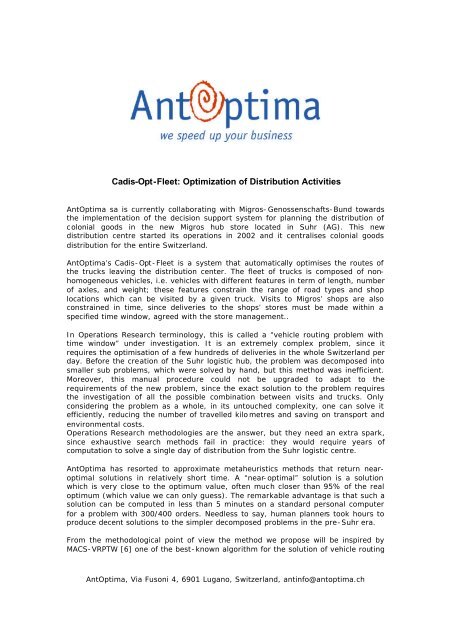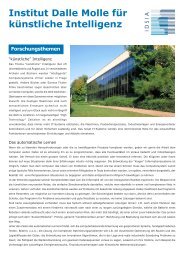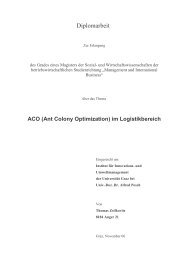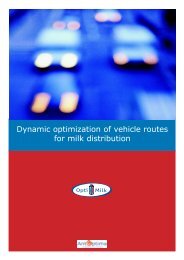Migros (PDF 35kb) - Antoptima SA
Migros (PDF 35kb) - Antoptima SA
Migros (PDF 35kb) - Antoptima SA
You also want an ePaper? Increase the reach of your titles
YUMPU automatically turns print PDFs into web optimized ePapers that Google loves.
Cadis-Opt-Fleet: Optimization of Distribution Activities<br />
AntOptima sa is currently collaborating with <strong>Migros</strong>-Genossenschafts-Bund towards<br />
the implementation of the decision support system for planning the distribution of<br />
colonial goods in the new <strong>Migros</strong> hub store located in Suhr (AG). This new<br />
distribution centre started its operations in 2002 and it centralises colonial goods<br />
distribution for the entire Switzerland.<br />
AntOptima’s Cadis-Opt-Fleet is a system that automatically optimises the routes of<br />
the trucks leaving the distribution center. The fleet of trucks is composed of nonhomogeneous<br />
vehicles, i.e. vehicles with different features in term of length, number<br />
of axles, and weight; these features constrain the range of road types and shop<br />
locations which can be visited by a given truck. Visits to <strong>Migros</strong>’ shops are also<br />
constrained in time, since deliveries to the shops’ stores must be made within a<br />
specified time window, agreed with the store management..<br />
In Operations Research terminology, this is called a “vehicle routing problem with<br />
time window” under investigation. It is an extremely complex problem, since it<br />
requires the optimisation of a few hundreds of deliveries in the whole Switzerland per<br />
day. Before the creation of the Suhr logistic hub, the problem was decomposed into<br />
smaller sub problems, which were solved by hand, but this method was inefficient.<br />
Moreover, this manual procedure could not be upgraded to adapt to the<br />
requirements of the new problem, since the exact solution to the problem requires<br />
the investigation of all the possible combination between visits and trucks. Only<br />
considering the problem as a whole, in its untouched complexity, one can solve it<br />
efficiently, reducing the number of travelled kilometres and saving on transport and<br />
environmental costs.<br />
Operations Research methodologies are the answer, but they need an extra spark,<br />
since exhaustive search methods fail in practice: they would require years of<br />
computation to solve a single day of distribution from the Suhr logistic centre.<br />
AntOptima has resorted to approximate metaheuristics methods that return nearoptimal<br />
solutions in relatively short time. A “near-optimal” solution is a solution<br />
which is very close to the optimum value, often much closer than 95% of the real<br />
optimum (which value we can only guess). The remarkable advantage is that such a<br />
solution can be computed in less than 5 minutes on a standard personal computer<br />
for a problem with 300/400 orders. Needless to say, human planners took hours to<br />
produce decent solutions to the simpler decomposed problems in the pre-Suhr era.<br />
From the methodological point of view the method we propose will be inspired by<br />
MACS-VRPTW [6] one of the best-known algorithm for the solution of vehicle routing<br />
AntOptima, Via Fusoni 4, 6901 Lugano, Switzerland, antinfo@antoptima.ch
problems that has been able to outperform state of the art algorithms and to<br />
compute new solutions for benchmark problems. The method is able to compute in a<br />
very short time an optimised problem solution and can improve this solution step by<br />
step through a learning mechanism. In any moment it is possible to stop the<br />
algorithm and to ask for the best computed solution without the need to wait until<br />
the process is terminated. MACS-VRPTW, a Multiple Ant Colony System for Vehicle<br />
Routing Problems with Time Windows is based on Ant Colony Optimisation (ACO [4])<br />
a new optimisation approach inspired by the foraging behaviour of real colonies of<br />
ants (see [1],[2],[3]). The basic ACO idea is that a large number of simple artificial<br />
agents are able to build good solutions to hard combinatorial optimisation problems<br />
via low-level based communications. Real ants cooperate in their search for food by<br />
depositing chemical traces (pheromones) on the ground. An artificial ant colony<br />
simulates this behaviour.<br />
In the distribution problem under investigation trucks correspond to ants and shops<br />
to food to be collected (delivered). Recently, IDSIA, Istituto Dalle Molle di Studi<br />
sull’Intelligenza Artificiale, of which AntOptima is a spin-off, has proposed many ACO<br />
based algorithms to solve different types of combinatorial optimisation like the<br />
sequential ordering problem [5], the quadratic assignment problem [6] and the<br />
mentioned vehicles routing problem with time windows [4]. In these domains the<br />
approximate algorithms developed are among the best currently available and for<br />
many benchmark instances they have found new best known solutions. These<br />
researches are the output of many research projects supported among other by the<br />
Swiss National Science Foundation, the Swiss CTI, Commission for Technology and<br />
Innovation and the European Commission.<br />
References<br />
[1] E. Bonabeau, M. Dorigo, G. Theraulaz, Nature, Volume 406 Number 6791 Page<br />
39 - 42 (2000)<br />
[2] E. Bonabeau, G. Theraulaz, Swarm Smarts, Scientific American, March 2000,<br />
Page 55- 61 (2000)<br />
[3] Duft der Daten, Der Spiegel, n.46, November 13 th , 2000,<br />
http://www.derspiegel.de/spiegel/0,1518,102399,00.html<br />
[4] Dorigo M., G. Di Caro and L. M. Gambardella. Ant Algorithms for Discrete<br />
Optimization. Artificial Life, 5,2, pp. 137-172, 1999.<br />
[5] Gambardella L.M, Dorigo M., An Ant Colony System Hybridized with a New Local<br />
Search for the Sequential Ordering Problem, INFORMS Journal on Computing,<br />
vol.12(3), pp. 237-255, 2000<br />
[6] Gambardella L.M, Taillard E., Dorigo M., Ant colonies for the Quadratic<br />
Assignment Problem , Journal of the Operational Research Society, 50, pp.167-176,<br />
1999<br />
[7] Gambardella L.M, Taillard E., Agazzi G., MACS-VRPTW: A Multiple Ant Colony<br />
System for Vehicle Routing Problems with Time Windows , In D. Corne, M. Dorigo<br />
and F. Glover, editors, New Ideas in Optimization. McGraw-Hill, London, UK, pp. 63-<br />
76, 1999<br />
AntOptima, Via Fusoni 4, 6901 Lugano, Switzerland, antinfo@antoptima.ch






